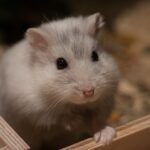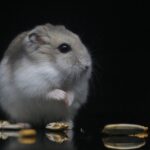Can Hamsters Eat Cherries? — A Comprehensive Guide
Hamsters are adorable and beloved pets that require a balanced and suitable diet to thrive. As a responsible hamster owner, you might wonder whether your furry friend can indulge in the delightful taste of cherries. In this article, we will provide you with important insights regarding the suitability of cherries for hamsters and their potential benefits.
The Advantages of Cherries for Hamsters
Cherries can offer a variety of health boosts to your hamster due to their nutritional composition. These delectable fruits contain essential vitamins such as vitamin A and vitamin C, which contribute to a strong immune system and overall well-being. Moreover, cherries are rich in antioxidants that help combat oxidative stress in your pet’s body, potentially reducing the risk of certain diseases.
Boosting Digestive Health
Fiber is an essential component of a hamster’s diet, and cherries provide a good amount of it. When consumed in moderation, cherries can help regulate your hamster’s digestion, promoting a healthy gut and preventing gastrointestinal issues.
Supporting Hydration
Hydration is crucial for your hamster’s overall health, and cherries can contribute to their fluid intake. While cherries contain some water content, it is important to note that they should never replace your hamster’s primary source of hydration, which should be fresh, clean water available at all times.
Adding Variety to the Diet
Providing a diverse and enriching diet is essential for hamsters, and cherries can be a delightful addition. While it’s important to ensure that cherries remain a treat and not a staple in their diet, offering this occasional fruity indulgence can enhance your hamster’s feeding experience.
Recommended Frequency and Quantity
When introducing cherries to your hamster’s diet, it is important to exercise caution and follow appropriate guidelines for their well-being.
The recommended frequency for feeding cherries to your hamster is once or twice a week. Remember to offer them in small quantities. A single cherry, pitted and sliced into small, manageable pieces, is sufficient for a hamster’s occasional treat. Overfeeding cherries or providing them too frequently may lead to digestive issues or an imbalance in their diet.
Potential Cautions when Feeding Cherries to Hamsters
While cherries can offer numerous benefits, there are some precautions to keep in mind to ensure the safety and well-being of your hamster.
1. Remove the pits: Cherries contain pits that pose a choking hazard to hamsters. Always pit the cherries before offering them to your furry friend. Ensure that no seeds or pits are accidentally left behind.
2. Moderation is key: Cherries, like any other fruit, should be given in moderation. Excessive consumption can lead to stomach upset and diarrhea. Always prioritize a well-balanced diet comprising hamster pellets, fresh vegetables, and limited fruit treats.
3. Allergies and individual reactions: It’s essential to monitor your hamster’s response after introducing cherries to their diet. If you notice any signs of an allergic reaction, such as itchiness, swelling, or difficulty breathing, discontinue feeding cherries immediately and consult a veterinarian.
Can Other Pets Safely Enjoy Cherries?
In a household with multiple pets, you might wonder if cherries are safe for other furry companions. While cherries can be a delightful treat for hamsters, they are not suitable for all pets. Cherries should not be offered to dogs, cats, or other animals due to their potential toxic effects. Always consult with a veterinarian before introducing any new food to your pets other than hamsters.
Conclusion
In conclusion, cherries can be a tasty and nutritious treat for your hamster when offered in the right way. Remember to pit the cherries, feed them in moderation, and prioritize a well-balanced diet for your furry friend. By following these guidelines, you can ensure your hamster’s safety and well-being while adding some fruity excitement to their diet. Cherish your hamster with cherries, but always feed them responsibly!






